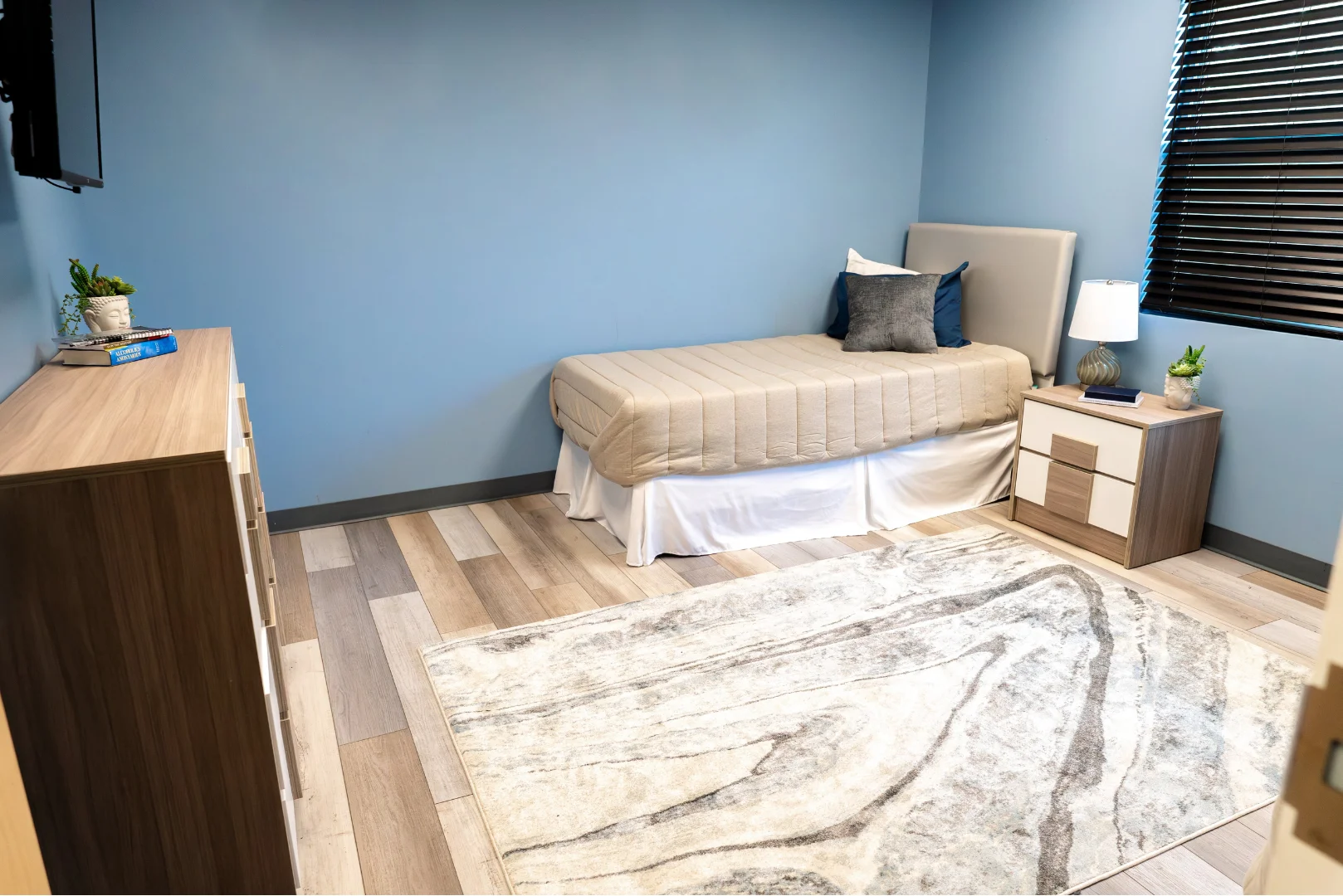Anxiety Disorder Treatment

What is Anxiety?
Anxiety is generally defined as a feeling of unease, worry, or nerves, usually surrounding a specific event or unknown outcome. The vast majority of people experience anxiety at various points in their lives. Preparing for a job interview, speaking in front of a crowd, or studying for an exam are all examples of real-life situations that trigger fear and dread within most people.
It is normal to feel those emotions every once in a while, and sometimes that bit of uncertainty pushes people to be their best selves. For example, anxiety can help people prepare. Would you have gotten that job had you not been pressured to prepare so much in advance? Would your speech have been as rousing without feeling afraid of the response? Would you have scored as high on that exam had it not scared you into studying so much? The answer to those questions is often “no.”
But what happens when that anxiety never goes away and begins impacting your daily life in significant ways? If your anxiety persists or causes distress, you are no longer dealing with anxiety, but rather an anxiety disorder.
Prolonged feelings of distress and fear that are overwhelming, crippling, and prevent you from living a productive life is a problem that should never be ignored. It is something you should seek treatment for, and never be ashamed about.
At 1st Step Behavioral Health, we are dedicated to helping individuals overcome the burden of anxiety and lead fulfilling lives. Our anxiety treatment programs in Florida are designed with your well-being in mind, offering a supportive and compassionate environment where you can find the help you need.

Symptoms of Anxiety
There are several physiological and psychological signs of anxiety. Some may be more prominent or longer lasting than others. Common symptoms of anxiety include:
- Nightmares
- Shortness of breath
- Trouble speaking
- Muscle tension
- Feeling fatigued
- Flashbacks to trauma
- Gastrointestinal (GI) issues
- Experiencing a faster heart rate
- Having difficulty concentrating
- Disordered sleeping patterns
- Being irritable, nervous, or on edge
- Obsessive and recurring thoughts
- Feeling a sense of impending doom or danger
- Rapid breathing or hyperventilation, shaking, and/or sweating
Understanding Anxiety Disorders
Due to social stigmas, mental illness is not something that is spoken about openly. There are even some people who do not believe that it exists and more that do not see it as a priority. This has translated into a lack of mental health resources that are accessible and affordable. Thankfully, as research around mental illness and anxiety increases due to advances in technology, more individuals can gain the information we need to understand anxiety.
Since knowledge of anxiety is so poorly taught to the average person, most people do not know how many types of anxiety disorders there are and the wide variety of treatments that are available. Many do not even know how to tell if they have anxiety, let alone an anxiety disorder. Oftentimes, individuals are also unable to identify the stressors in their lives that have caused their anxiety disorder in the first place.
Anxiety disorders are the most prevalent mental health issue in the United States. Many individuals experience symptoms before the age of 21. Of more than 40 million adults in the country, approximately 19.1%, struggle with an anxiety disorder. Additionally, around 7% of children between the ages of 3 and 17 experience anxiety-related problems every year. Clearly, the facts and numbers are there. Now it is a matter of how you will take your life into your own hands and make a change.
Understanding the Different Types of Anxiety Disorders
There are five major types of anxiety disorders. These include:
Obsessive-Compulsive Disorder (OCD)
OCD involves intrusive, obsessive thoughts and repetitive, ritualistic behaviors or mental acts performed in response to these obsessions. Individuals with OCD engage in these compulsions to alleviate anxiety and distress. For example, someone with OCD might be so preoccupied with locking their front door and windows at night that they lose sleep.
Panic Disorder
Panic disorder is marked by experiencing panic attacks, which are very sudden feelings of immense dread and terror that could lead to trouble breathing or body convulsions. The fear is so intense that it could trigger a physiological response that feels similar to a heart attack and may lead an individual to believe that they are dying.
Panic attacks are sudden and intense episodes of fear or discomfort that can include symptoms like a racing heart, sweating, trembling, and a feeling of impending doom. Fear of having another panic attack can lead to avoidance behaviors.
Most panic attacks wane after thirty minutes but can leave your body fatigued and ill-equipped to continue with the rest of the day.
Post-Traumatic Stress Disorder (PTSD)
PTSD develops after experiencing something so traumatic that it leaves a lasting mark.PTSD can develop after exposure to a traumatic event and is characterized by symptoms such as flashbacks, nightmares, hypervigilance, and emotional numbness. These symptoms can persist for months or even years after the traumatic experience. These re-imaginings can numb and paralyze someone, or trigger intense anger and violence as a response to the trauma.
PTSD is usually associated with veterans who have witnessed war. Yet there is a stigma surrounding soldiers admitting to anxiety and a lack of funding to provide them with long-term mental illness treatment.
It is wrong, however, to forget that PTSD can also happen to everyday civilians who experience childhood trauma that persists into adulthood. Events do not only have to involve bloodshed or tremendous violence to be considered traumatic. Sometimes, these events could include the loss of a loved one, emotional abuse, and more.
Social Anxiety Disorder
People with social anxiety disorder have an intense fear of social situations, especially those involving unfamiliar people or public speaking. They may worry excessively about being judged or humiliated in social settings and tend to avoid them whenever possible. This is also known as social phobia.
Social anxiety can make you unwilling to leave your house due to a feeling that others will judge or criticize you. You may be unable to speak or even make eye contact with other people. This could lead to issues in the workplace and make you unable to maintain a relationship or stay in contact with family and friends.
Therapies and Treatments for Anxiety
Mental illness, like physical illness, should be treated. Once you know what anxiety is, what all the different types of anxiety disorders there are, and how to identify the symptoms; the next step is to seek the treatment types that best meet your specific needs. Professional recovery centers offer several types of mental health treatment:
- Cognitive-behavior therapy (CBT): CBT is a behavioral therapy that helps clients identify negative thought patterns they may have that trigger panic attacks or other physiological responses. Once they know this, the individual can change the way they think and introduce healthy coping mechanisms in their daily life.
- Exposure therapy: Exposure therapy is a psychological treatment technique used to help individuals confront and gradually reduce their irrational fears and anxiety by exposing them to the feared object, situation, or thought in a controlled and systematic way. This exposure allows the individual to learn that their feared outcome is unlikely to occur and that their anxiety decreases over time, helping them overcome their phobias or anxieties.
- Medications: Sometimes therapy is more effective when individuals pair it with medication. In many cases, anxiety needs to be treated through a pharmaceutical approach. There are numerous antidepressants and anxiety medications available to tackle anxiety disorders and mitigate the troublesome physical symptoms.
If you or someone you know is dealing with anxiety, help is available. There is nothing wrong with you or them. No one who has anxiety is broken. There is simply an issue that needs to be resolved so you or that person can live the life anxiety is preventing you from having. Thankfully, through treatment, it’s possible to manage the symptoms of anxiety.
Co-Occurring Disorders: When Anxiety and Addiction Co-Exist
When a person has a dual diagnosis, he or she suffers from both a substance use disorder (like drug or alcohol addiction) and a mental health disorder at the same time. Sometimes, individuals can develop a mental illness as a result of their substance abuse. After all, addiction can alter a person’s brain chemistry. This could lead to depressive disorder, anxiety disorder, or another mental illness.
In other cases, a mental health disorder can cause an addiction problem to develop. Individuals who suffer from the effects of mental illness may turn to alcohol or drug use in order to cope with their symptoms. As a result, they may become dependent on the substance that they’re using. Eventually, this may cause individuals to develop addictions.
When it comes to anxiety, people may find that drugs and alcohol can temporarily soothe their symptoms, causing them to steadily increase their substance abuse. However, continued substance abuse can turn into an addiction, which can cause even more anxiety than before.
If you’re suffering from co-occurring disorders, know that you are not alone. The 2018 National Survey on Drug Use and Health reports that about 9.2 million adults experienced both mental illness and substance use disorder that year. Of these 9.2 million individuals, only 34.5% are treated for mental health and 3.9% receive help for addiction. Only 9.1% got help for both addiction and mental health.
It’s important for those who have dual diagnoses to get professional treatment. The program a person selects should focus on addressing both mental illness and physical addiction. Treating one without tending to the other can cause more problems down the road, including relapse. So, those who have co-occurring disorders should seek specific and individualized help and support.
Find Treatment for Anxiety in South Florida Today
Although you may be one of the millions who have anxiety, you don’t have to remain in this situation. There is hope for you! If you’re ready to overcome addiction and develop healthy ways to address your mental health, please contact us today. Allow our Florida anxiety treatment program to help you regain control of your life.
